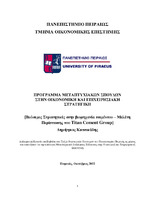Βιώσιμες στρατηγικές στην βιομηχανία τσιμέντου – Μελέτη περίπτωσης του Titan Cement Group
Sustainable strategies on cement Industry - A case study of Titan Cement Group

Προβολή/
Λέξεις κλειδιά
Βιώσιμη ανάπτυξη ; Στόχοι ESG (Περιβάλλον, Κοινωνία, Εταιρική Διακυβέρνηση) ; Ετήσιες εκθέσεις απολογισμού ; Δείκτες βιωσιμότητας ; Oλική ποιότητα διαχείρισης περιβάλλοντοςΠερίληψη
Στην παρούσα μελέτη εξετάζονται οι έννοιες των βιώσιμων στρατηγικών (Περιβάλλον-Κοινωνία- Εταιρική Διακυβέρνηση) στις επιχειρήσεις και ειδικότερα στις δραστηριότητες και στη λειτουργία του Ομίλου ΤΙΤΑΝ (Διεθνής παραγωγός τσιμέντου και δομικών υλικών). Η Περιβαλλοντική Πολιτική εφαρμόζεται πλέον από όλες τις εταιρίες παγκόσμια. Ο κίνδυνος της κλιματικής αλλαγής και η προστασία του περιβάλλοντος σε συνδυασμό με την προστασία των τοπικών κοινωνιών οπού δραστηριοποιούνται βιομηχανίες και ο σεβασμός των εργαζομένων/συνεργατών επιτάσσει την εφαρμογή πολιτικών βιωσιμότητας σε όλο τον επιχειρηματικό κόσμο. Ο όμιλος ΤΙΤΑΝ συμμορφώνεται με τις κοινοτικές και διεθνείς οδηγίες και κανονισμούς για την βιωσιμότητα εφαρμόζοντας στοχευμένες πολιτικές βασισμένες σε διεθνή πρότυπα και πιστοποιήσεις. Καινοτομεί με πρωτότυπα προϊόντα χαμηλού περιβαλλοντικού αποτυπώματος ενώ παράλληλα κάνει χρήση συγχρόνων εργαλείων ψηφιακής μετάβασης. Ο όμιλος εστιάζει στην επίτευξη της μακροπρόθεσμης βιωσιμότητας των επιχειρηματικών δραστηριοτήτων του και στη βελτίωση των επιδόσεών του στη βάση τριών πυλώνων: της οικονομικής ανάπτυξης, της κοινωνικής υπευθυνότητας και της περιβαλλοντικής ευθύνης κατέχοντας διάφορες πιστοποιήσεις από κορυφαίους φορείς στην παγκόσμια βιωσιμότητα ενώ συμπράττει συνεργασίες με οργανισμούς για την μέγιστη επίδοση στα κριτήρια που έχουν θεσμοθετηθεί για την παγκόσμια αειφορία. Βάσει της δέσμευσής του για μηδενικό περιβαλλοντικό αποτύπωμα, κυκλική οικονομία, εταιρική κοινωνική ευθύνη και υγειά και ασφάλεια στην εργασία, δημοσιοποιεί αναλυτικές ετήσιες εκθέσεις απολογισμού, βάσει διεθνών προτύπων, σχετικά με τις επιδόσεις βιωσιμότητας σε όλη την αλυσίδα παραγωγής καθώς και στις δομές του, οι οποίες ελέγχονται ως προς την εγκυρότητα τους από ανεξάρτητες ελεγκτικές αρχές. Με αυτόν τον τρόπο ο όμιλος επιτυγχάνει την διαφάνεια και την πιστοποίηση των πολιτικών/στρατηγικών λειτουργίας του ενώ παράλληλα αυξάνει την ανταγωνιστικότητά και την φερεγγυότητα του.


